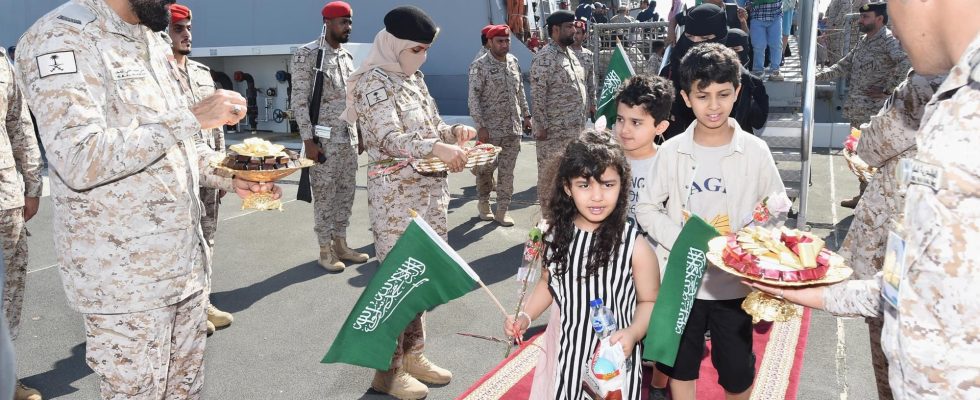The United States evacuated by means of a helicopter operation its embassy in Khartoum, the Sudanese capital, on Saturday. An initiative quickly followed by France, this Sunday, April 23, while the deadly fighting between regular army and paramilitaries have been raging for more than a week. The country has also suffered an “almost total internet blackout”, said NetBlocks, a London-based organization that monitors web access around the world. The violence, which broke out on April 15 in Khartoum and the Darfur region (west), left hundreds dead and thousands injured, according to the World Health Organization (WHO). They caused the flight of thousands of people and led to the mobilization of several countries to evacuate their nationals.
France has begun a “rapid evacuation operation” of its citizens and diplomatic personnel from Sudan, the Foreign Ministry announced on Sunday. European nationals and nationals from “allied partner countries” are also supported.
US President Joe Biden had earlier announced that the military had “conducted an operation to extract US government personnel from Khartoum”, according to a statement released late on Saturday evening. The Head of State also called for an “immediate and unconditional ceasefire” to put an end to this “senseless” violence.
Joe Biden particularly thanked Djibouti, Ethiopia and Saudi Arabia for their support in this operation. The operation involved three CH-47 Chinook helicopters and allowed the evacuation of “just under a hundred” people, including several foreign diplomats, said a senior State Department official, John Bass. He further rejected any “coordination” with the paramilitaries of the Rapid Support Forces (RSF), which are fighting against the regular Sudanese army and had previously claimed to have “coordinated” the operation with the United States. This did not concern the other American nationals in Sudan, who would be several hundred and for whom an evacuation is not planned “for the moment”, specified John Bass.
The first civilians evacuated in Saudi Arabia
On Saturday, Saudi Arabia had evacuated from Sudan 91 Saudi citizens and about 66 nationals of 12 other countries (Kuwait, Qatar, United Arab Emirates, Egypt, Tunisia, Pakistan, India, Bulgaria, Bangladesh, Philippines, Canada and Burkina Faso) to the port of Jeddah. The evacuation was carried out by the kingdom’s naval forces with support from other branches of the military, the Saudi ministry said in a statement.
Violence in Sudan erupted on April 15 between the army of General Abdel Fattah al-Burhane, the country’s de facto leader since the 2021 putsch, and his deputy turned rival, General Mohamed Hamdane Daglo, who commands the Support Forces Rapid (FSR), feared paramilitaries. On Friday, the army announced that it had “accepted a three-day ceasefire” for Eid al-Fitr, the Muslim holiday that marks the end of the holy fasting month of Ramadan. But the army and the FSR did not respect their commitments. The still very provisional balance sheet amounts to more than 420 dead and 3,700 injured, according to the WHO.
While the two sides are also engaged in a communications battle, it is unclear who controls the country’s airports and what state they are in, having been the scene of fierce fighting since day one of the conflict. The two generals took power in the 2021 coup, halting the process towards a democratic transition after the fall of dictator Omar al-Bashir in 2019.
Hostilities broke out when the two men were unable to agree on the integration of General Daglo’s paramilitaries into General Burhane’s regular troops, after weeks of political negotiations under international auspices. In Khartoum, a city of five million people, many civilians venture outside their homes just to get emergency food or to flee. This week, Eid al-Fitr has had a bitter taste for them. We usually celebrate this holiday “with pastries and gifts for the children”, but this year, it is “gunshots and the smell of death”, confides to AFP Sami al-Nour, a resident of Khartoum.
Living conditions are probably worse in Darfur, already the scene of a terrible conflict in the 2000s, no one being able to go to this region immediately. On site, a doctor from Médecins sans frontières (MSF) evokes a “catastrophic situation”. In Sudan, Africa’s third-largest gold producer and yet one of the world’s poorest countries, health services have been on their knees for decades and a third of the 45 million people suffer from hunger. The cessation of operations by most humanitarian organizations will aggravate the situation. And the conflict now threatens to gain ground beyond Sudan’s borders, experts say.
